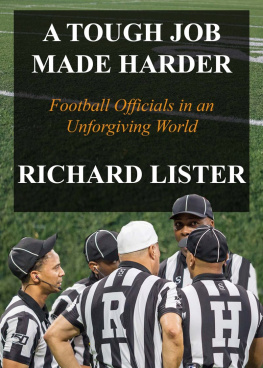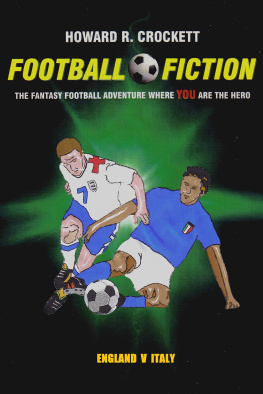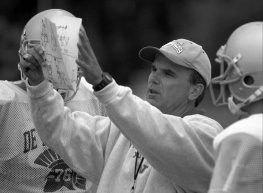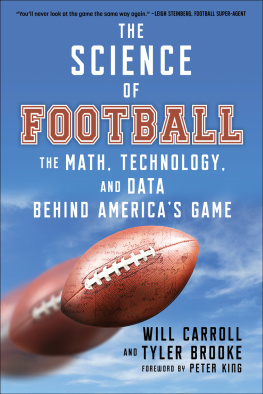This ebook is licensed to you for your personal enjoyment only. This ebook may not be sold, shared, or given away.
Copyright 2021 by Richard J. Lister
ALL RIGHTS RESERVED.
No part of this work may be used, reproduced, or transmitted in any form or by any means, electronic or mechanical, without prior permission in writing from the publisher, except in the case of brief quotations embodied in critical articles or reviews.
Preface
While writing The Third Team ten years ago, I discovered the unswerving passion National Football League officials bring to their work. For them, the job is not simply an engaging avocation. It is a calling. The zeal that impels them sets its hook early in their careers, often when they officiate their first Pop Warner or peewee game.
Football officials at every level feel the same pull. For most whom I met, the desire to ascend to the next level inspired them to excel. Many have nurtured the hope to one day be called to the NFL.
I have undertaken this second book with an eye toward learning how changes in officiating over the past decade have affected those who perform it. My exploration revealed a startling finding. The devotion to officiating, at least its breadth, seems to be on the wane.
Some seven in ten who embark on officiating leave it behind within five years. This surprising fact reinforces my suspicion that changes have indeed permeated officiating over the past ten years. What has caused so many to discard what others embrace with fervor?
Among the obvious reasons is disrespect from fans and coaches, which at times has degenerated to violence. The instances in which officials across all sports are subjected to assault have become too frequent. Even short of bodily attack, verbal abuse is consequential. A point arrives for many where they decide the joy in being part of the game isnt worth the grief that fans, coaches, and players heap on them. Which leads to the question: What is causing the anger?
Some answers are obvious. Most easily understood is the ire dispensed by players and coaches. Competitive fuel drives emotion, and livelihoods depend on results. Those factors alone mean that anger is readily prodded by a perceived officiating slight.
At the youth and high school levels, parents are invested in their childrens success. But from there, things become more perplexing.
The tribal connection to ones alma mater or adopted college team can evoke more than occasional irrationality. And the NFL? The same sort of attachment to a team can cause varying levels of unraveling when things dont go well. People much smarter than I will have to explain the forces that fierce team partisanship unleashes.
Then, of course, theres the money wagered week over week. Gambling losses are obvious irritants. That includes the legions engaged in fantasy football.
Devotion has always given followers a psychological stake in the games outcomes. The cycle starts with ever-increasing fan engagement. Money follows. Benefactors demand results. More fans engage, and more money pours in. Pressure grows for players, coaches, and yes, officials.
So, God forbid that an officials call deflects the games arc.
Whether officials have made the right or wrong call, on-field law enforcement is an easy target. A target that has become more inviting thanks to technology. Phenomena that existed only on developmental drawing boards lists in decades past are now commonplace. The demand for victory unimpeded by officiating foible has brought us technology in the service of eliminating errors.
The cameras that bring football into homes throughout the world provide a microscopic postmortem into every minute movement that comprises a play warranting a second look. Or a third, fourth, fifth. Well, you get the idea.
Replay review is entrenched in the officiating bailiwick. Irony lies in these modern instruments intended to reinforce officials performance but that also scatter seeds for disparagement.
Todays high-def cameras, with the capability to produce crisp images at the slowest of replay speeds, cause the viewer to wonder how it was possible the person in the striped shirt could possibly have not seen the action the same way. It is difficult to grasp that no human eye can possibly perceive the images television viewers see. But that doesnt stop those so inclined to immediately dispatch word of an officiating mistake to the cyber universe.
Social media allows anyone who wants a bullhorn and a podium to say things, no matter how outlandish, that shape commentary. It is a light-speed means by which to spread recrimination.
And the emphasis on winning in the National Football League and Division I college football filters downward. The pressure can be found in high school games. Its cause is the expectation that officiating schoolboys games will be pristine, just as with their higher profile counterparts.
It is small wonder, then, that many turn away from a rewarding avocation in disillusionment. With the numbers diminishing and the demographics skewing toward an older average age, problems for football lurk on the horizon.
But the good news is that those who allow officiatings lure to entice them are as dedicated and driven as ever. They recognize their essence to the game.
I have called on prominent officiating voices to consider what has changed in officiating, what is good, what is wrong, and what should be reshaped. Perhaps in the end, readers will conclude that those who officiate at the games highest levels excel at a job that is far more difficult than the average fan appreciates.
Not only that, those undertaking to read the following pages will find that the ones wearing the striped shirt are wholly dedicated to doing the work with fidelity to fairness and the players safety.
And for those wanting to embark on making officiating their avocation or maybe even a career, they might find the experiences of the books contributors to be beacons to guide them toward an endeavor so many have come to embrace.
For even with its many challenges, those who invest their time and talent in officiating football find joy and passion that those in stadium seats and in front of televisions cannot start to comprehend.
Richard Lister
May 2021












